“And Then There Was Silence”- Civil Party Remembers Execution
Today, August 15, 2016, three Civil Parties took their stance in front of the Chamber. Civil Party Yun Bin told the court about an execution site where the Khmer Rouge attempted to kill him, but survived and escaped after all other persons had been executed. Civil Party Kaun Sunthara recounted how her family members were arrested and killed at S-21. Civil Party Chau Kim explained how his brother, former politician and diplomat Chau Seng, was taken away from Boeng Trabek and later killed.
Civil Party: Yun Bin
All parties were present, with Nuon Chea following the hearing from the holding cell. Trial Chamber President Nil Nonn was still absent and replaced by Judge Ya Sokhan.
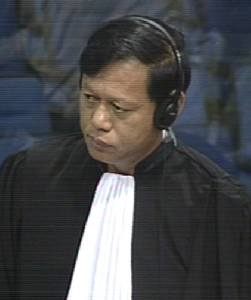
Civil Party Lawyer Lor Chunthy
Civil Party Yun Bin was born on 17 October 1955 and lives in Tboung Khmum Province. Civil Party Lawyer Lor Chunthy put questions to the Civil Party. Before 17 April 1975, Mr. Bin lived in Tuol Meanchey Village in Prateak Commune. They were sent to live in Kos Au Tanseng Island when the Khmer Rouge took power. They were assigned to live in a rice field and to build canals and dykes. He was assigned to clear the forests and to transplant rice seedlings. He was called to go for a study session while working on a peanut plantation. The person who called him was a militiaman called Pauk who was sixteen years old. He was called with two other people. Pauk told him that the order came from commune chief Leuv. They were called to go to the commune office. When he arrived at the commune office, he saw six other youths who came from several districts. There were nine of the altogether. They brought them to Peam Cheng with a horse cart. They were all put on one horse cart and they arrived at Peam Cheng at around 10 o’clock. Upon his arrival, he saw around five or six “Southwest people” who wore black clothes and white and blue scarves. These people put the information of where the newly arrived people came from in a book. They were told that they would attend a study session for four or five days, and that “the Party would never kill any person”. They were told to wait for a vehicle, which would bring them to the study session. They waited until around 7 pm. By that time, they were not yet tied up, but later they were “because they said that they were afraid that we might conceal a knife or weapon on our body.” They were thrown onto a vehicle after their hands had been tied. The vehicle was around half-full. Some of the people on the vehicle did not wear any shorts and he could see blood on their body. “I was so scared, because I was afraid that we would be taken away and killed. My heart was pounding”. He tried to free himself from the rope.
Execution site
When they saw him trying to free himself,
“They wanted to hit me with a rifle butt, but the other said that I would be killed anyway”.
Thus, they tied another rope around his hands. This happened to all people. There were four women on the car. There were around forty people in total on the vehicle. It took them around fifty minutes to arrive where they were supposed to arrive. When they arrived, they took the women off the vehicle first. “They kicked me off the truck and walked me. There were four or five of them who accompanied me.” Some others were guarding him as well. When they arrived at the execution site,
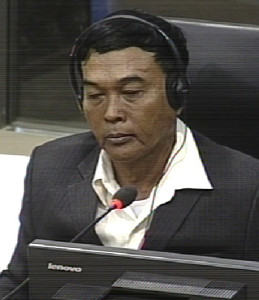
Yun Bin
“They beat me with an ax, and I lost my consciousness. And during my unconsciousness, my feeling was that I ran to my parents to tell that I was not taken for a study session.”
When he was in the well, he recounted that bodies were thrown onto him.
“There were four or five people on top of my body. At that time, I saw many dead people around me. Some of them were swollen and with worms. When I regained the consciousness, I tried to release myself from the strings, and finally I managed to get rid of my strings. At that time, I heard the Khmer Rouge soldiers ordering the people to be executed to sit down, and they beat [them] with the sound “pou pou” and they fell down”.
The men were executed first and then the women. He was wondering why they killed the women last after having taken them out of the truck first.
“Some of [those] who fell into the well did not die yet […] They shouted for help from their parents.” He listened to what would happen next. “It was at that time after they finished beating all the people who were brought to the execution site, they shouted at those who survived in the well “why are you still shouting”. So the Khmer Rouge soldiers threw a grenade to finish [them] off”. A few still survived and shouted for help, at which point the Khmer Rouge threw in a second grenade.
“And then there was silence. No more noise. There was only me in the well who survived. And I tried to listen to them, and I heard the sound of their vehicle going back.”
After the vehicles had left, he tried to leave. He looked for survivors, but only he had survived. He did not know whether the well was a well or a toilet, “because the smell in the well was so stringy. So there were fallen bodies all in the well. And I asked for anyone who may have survived”. However, he could not find anyone. When he tried to escape the well, he could not climb out of it.
“I tried to put the dead bodies on top of each other so I could step on them to climb out of the well. I realized I had three cuts on my head from where they hit me. […] I tried to step on the dead bodies to climb up the well.”
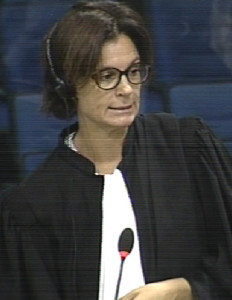
International Civil Party Lead Co-Lawyer Marie Guiraud
He heard the sound of footsteps coming to the well, so he put the dead bodies back where they were before and hid beneath them. The Khmer Rouge soldier said it seemed someone survived there, so he threw another grenade into the well. When they threw the grenade in the morning into the well, the grenade hit the bodies on top of him, but not him. “And the Khmer Rouge put soil into the well, so I tried to climb up and to have a look if they were still there. I would ask them to throw a grenade at me or to shoot me. But they were not there, so I attempted to climb up again. There were a lot of blood on the soil that the Khmer Rouge put into the well. I swore to myself that I would try to survive. I asked the souls of those who died in the well to survive. […] And I promised to them that I would find justice for them, because they cheated us. They said that we would be taken for study […] but instead took us to be killed.”
He told himself that he would try to climb up three times. If he failed, he would shout at them to shoot or throw a grenade at him. He fell down: “I was in great despair”.
Returning Home
International Civil Party Lead Co-Lawyer Marie Guiraud took over from her national colleague and asked what the physical and psychological effects were of this event.
“Let me finish my story. When I attempted again, it seemed that the dead bodies from my comrade pushed me from below. And I managed to escape the well, and when I escaped, I realized that it was not a well, it was the French toilet. I saw two Khmer Rouge soldiers guarding around 100 meters away, and I tried to walk backwards. There were scars, wounds on my heads. At that time, after I walked into the banana plantation, I started to run, and I saw the Khmer Rouge walking in the distance, so I thought to myself that if [they] saw me, they would arrest me again […] I was so hungry at the time, while my head was still bleeding. I tried to find tree leaves to eat, but I could not eat well, because my mouth was swollen […]. Finally I arrived at my home, and I told my parents that they did not take me to study. In fact, they took me to be executed. On the way that I ran to my home, I saw a small boy, aged around 16, who was herding the cow, and I asked him why he came here, and he told me that he came to herd the cows. My apology, I would like to tell you that I saw a horse cart that was also transporting people to be killed, so I kept on waiting, and waiting, until there was no presence of people traveling on the road, and then I continued my journey.”
Once he came into the banana plantation, he changed directions towards the south. “And I kept running and running”. He saw a bean plantation: “So I collected some beans to eat. During the bean eating, I saw the ghost of my mother, and she told me to keep on running. I walked with great difficulty through the jungles under the blanket of nighttime. Finally, I arrived at a small cottage of Ta Nol. I could not make my journey forward anymore, because my body was so weak and smelly and my head was swollen and I seemed to lose my consciousness, and I heard a voice telling me “get up, get up, continue your journey, because they are coming”.”
He washed himself in a small stream, after which he continued his journey for another one hundred meters. “And I felt itchy in my head, because worms were trying to get inside the wounds of my head […] And touched something soft and realized that these were worms. “ He realized that he would have to get home, since he would die on the way otherwise.
It took him around half an hour to get home. “I knocked on the door of my home, and called upon my father to open the window”. At that time, his father put petrol on the wounds of his head. His father tried to hide him in the house, “by arranging a mosquito net and putting me inside that mosquito net”. He had a step mother. Her siblings and her brother were taken to be killed with him. “I told her that those people were taken away to be killed and those people who were taken away to be killed disappeared until nowadays. I concealed myself inside the house, and I received food from my stepmother, who brought this food from the kitchen hall. And those people at the kitchen hall asked her why she took the food from the kitchen hall, and she told them that she took the food to give it to the dogs”.
He received only a small portion of food. His father told him to hide inside the house. If he was found, “the whole family would be killed.”
His father became ill. “Since my return from the execution site on the 25 of May 1978 until late 1978, they evicted people in my village in Kampong Thom, and some of the villagers fled into the flooded forest, so I hid myself with my father in the forest. And because his illness became severe, he died in the forest.”
Ms. Guiraud asked about his statement that memories come back every time he passes by the location where they tried to execute him and that he almost loses consciousness every time.[1] People told him to visit the execution site after 1979, but he was scared to do so, “because every time I saw the site, I almost fainted. […]
All the people who were taken away with me all died, except me who survived. I was sorrowful and terrified. Each time I thought about that event, I told myself that I could not go back to that execution site, because it always haunted me, made me [scared].”
There were three scars on his head that remained until today.
Arrests of Other People
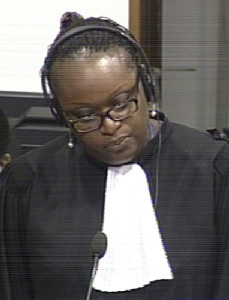
Khieu Samphan Defense Counsel Anta Guissé
The floor was granted to the Co-Prosecutors. Senior Assistant Prosecutor Vincent de Wilde asked whether New People and Cham were sent to his commune in the Khmer Rouge regime. He replied that there were no New People in his village. “There were no Cham living in my village [either]”. New People were “taken away and killed at a well called Ta Sin.” They were former medics and some people were arrested from mobile units. “I did not witness this, I only heard other people [talking] about this.” He heard that some women were raped before they were killed, and their bodies were laying naked in the well. He did not know about former soldiers.
Mr. de Wilde said that his Supplementary Application indicated that he met Sao Phim and wanted to know more about this.[2] Mr. Bin replied that he met him before the regime took control of the country, namely around 1974 or 1975.
Someone was taken away and killed. He did not know which group took him away, since he was called out then. The Southwest cadres came around four months prior to this.
Mr. de Wilde inquired whether there had already been purges in his area carried out by the Southwest cadres before he was taken away.[3] He confirmed that they were Southwest cadres.
At this point, the President adjourned the hearing for a break.
After the break, Mr. de Wilde asked about the moment when he was tied up.[4] Mr. Bin said that they said that they were tied up, because “Angkar didn’t trust us”.
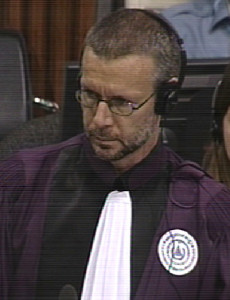
International Senior Assistant Prosecutor Vincent de Wilde
They were deputies of companies or units. He heard about arrests and purges after his attempted execution when he was hiding in the house. Mr. de Wilde then wanted to know when he got married.[5] He answered that he got married in almost 1979. The marriage took place at his house. He had met his fiancé a long time ago. He asked his stepmother to ask the woman whether she still loved him and wanted to marry him. The woman agreed and the marriage took place secretly at his home. With this, Mr. de Wilde concluded his line of questioning and the floor was handed to the Nuon Chea defense team.
Nuon Chea Defense Counsel Victor Koppe asked how he was certain that the date of execution was the 25 May 1978. He replied that he knew this, because he had a watch on his wrist on that day. He did not know whether anything else happened on that day. Mr. Koppe asked whether he was aware that this day was a “very important day” in the East Zone, which he did not. “What I remember was that the day shown on my watch was the 25th and I wrote in my notebook that it was the 25th May 1978”. Mr. Koppe asked whether he knew that this was the day that there was “massive fighting” between East Zone and Central forces, which the Civil Party denied. He heard fighting nearby, but he did not know how large the scale was.
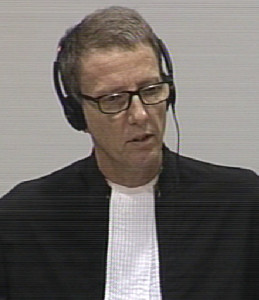
Nuon Chea Defense Counsel Victor Koppe
Mr. Koppe read an excerpt of an interview of an East Zone leader Ouk Bunchhoeun, in which he had said that there was fighting between East Zone forces and other forces.[6] He asked whether he was certain of the date because of his watch, or rather because of the fighting that took place. Mr. Bun reiterated that he could remember this because of the watch.
He was driving a horse cart to transport raisin when he met Sao Phim. He never met him again. Mr. Koppe inquired whether he knew what happened to Sao Phim on June 3, 1978, which the Civil Party did not, since he was in a mobile unit first and then hid in the house. He knew that the soldiers involved in the Civil Party’s arrest were from the Southwest, because they had accents. “They did not speak in the same way as us”. He did not know which province or district they came from. Turning to his last question, Mr. Koppe inquired whether any person could corroborate the account the Civil Party had told the court today, which Mr. Bun denied. “Only I knew about it. No one else knew about it.”
National Nuon Chea Co-Counsel Liv Sovanna took over the questioning. He turned back to the topic of accents and asked him for an example of a word that they said differently. Mr. Bun repeated that the people who spoke with a different accent were from the Southwest Zone. He knew this when they took him away.
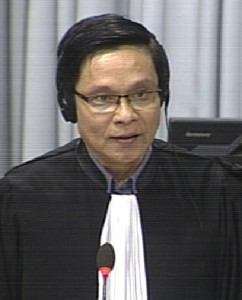
Nuon Chea Defense Counsel Liv Sovanna
His wife was from the mobile unit. The marriage took place when the country was almost liberated. Asked about arranged marriage, he said that his marriage was secret.[7] Only a few old people attended the wedding. The Presiding Judge Ya Sokhan said that these questions were outside the scope of the trial.
Mr. Sovanna moved on. Comrade Dim was the deputy director. Comrade Moeun, Dip, Phat and Ban were deputies of the mobile chief. The President gave the floor to the Khieu Samphan Defense Team, since the Nuon Chea Defense Team had run out of time.
Marriage
Khieu Samphan Defense Counsel Anta Guissé wanted to know whether it was correct that he hid at his parents’ place after having escaped from the execution site, which he confirmed. He remained hiding, but left the house to be seen by people who lived nearby. This was in late 1978, “because by that time, some areas were occupied by those liberation groups, and they also knew that the regime killed people. This happened before the fall of the regime in 1979”. He got married not long before the regime fell. By that time, people knew him and came to see him and knew that he was the sole survivor. The commune chief towards the end of the regime was a person from the Southwest. Prior to this, the commune chief was an illiterate person.
Ms. Guissé turned back to the topic of marriage and asked whether the marriage was secret or a collective marriage, since he had said in his Civil Party Application that there were several couples.[8] He answered that it was a private ceremony and that no village chief was present. Only the parents of the couples and a few elder people attended the wedding. He then said that it was held at the commune’s office. He then explained that there was wedding in which twenty couples were married, while his marriage was private, during which no other couples were married.
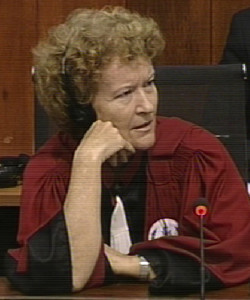
Judge Claudia Fenz
Ms. Guissé continued to probe on the issue, at which point Judge Claudia Fenz interrupted and said that it did not seem to contradict each other. Mr. de Wilde read out the English version, in which the collective marriage seemed to be separate from his own marriage. National Civil Party Lead Co-Lawyer Pich Ang read the Khmer version, which did not place the two events necessarily at the same time.
With this, the Civil Party’s testimony came to an end and he was given the opportunity to put questions to the accused. He asked: “Why [did they use] the pretext that we were sent for study sessions, but instead we were taken to be executed?”
New Civil Party: Kaun Sunthara
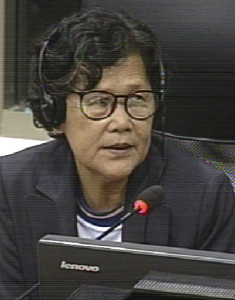
Khaun Sunthara
Judge Ya Sokhan thanked and dismissed him, and ordered to usher in 2-TCW-1051 into the courtroom. Ms. Kaun Sunthara was born on November 16, 1952 and lives in Kampong Speu Commune. Civil Party Lawyer Hong Kim Suon asked Ms. Sunthara to describe her living conditions to April 1975. She answered that she lived in Phnom Penh. She lived with her parents and her siblings. Her older brother married, left and lived with his wife. Her older sister lived in their house with her spouse. The Civil Party had a child and was pregnant. On April 18, 1975, they left their house in Phnom Penh and went to Kandal Province. They were told to return to Psar Tbor Commune. They were told to leave on April 17, but they stayed overnight and only left the next morning. Ms. Sunthara was around eight or nine months pregnant at this time. She delivered her son a few days after arriving at Psar Tbor. There were young midwives who helped her. She estimated that they were around twelve years old. “They did not know very much.” Nevertheless, it was a “safe delivery”, because her older sister helped her. There was no medicine to assist her. The medicine and syringes she had with her were taken away from her. She did not have much breast milk, so she picked some plants and cooked them with salt to feed him.
Unfortunately he did not live long. When he was about two years old, he could not even walk. He was so emaciated, and as a result he died.
Her first child died in around June 1977, and her second child died in September 1977. Her daughter was called Pauk Tary and five years old. She had dysentery. She caught her daughter eating snails and forbid her to do so. She believed that her daughter fell sick due to malnutrition. She was only allowed to take her to the hospital when she became sick. Men were separated from women in 1976. They were allowed to return home only around every ten days. Her husband did not know at first when the first child died. Her husband asked her whether she had beaten the child and that the child subsequently died, but she told him that she died because she was sick.
As for the death of the second child, the husband did not come to see the child when it was sick. “He was busy working”. She said he did not know that the child died either.
“He disappeared on the same day that the child died”.
The co-workers of her husband told her that he had been taken away, but they did not know where to.
At this point, Judge Sokhan adjourned the hearing for the lunch break.
Fate of Her Siblings
In the first session of the afternoon, Mr. Kim Suon asked what happened to her siblings and cousin. She recounted that her brother was evacuated to a city and then to Kor Tauch. Some people had told her that her brother was still alive and was living in Phnom Penh. After 1979, she had heard that her brother was killed at Tuol Sleng.
“My tears dropped down and my heart kept pounding upon hearing the news”.
She hitchhiked on a truck to Tuol Sleng, accompanied by her friend. There, she saw the photograph of her brother. “I was very shocked, because my brother was very sweet”. Her brother liked music, so when she heard a musical instrument, she felt sad. “I [suffer] until nowadays”.
Her sister was called Aum Ven Doni.
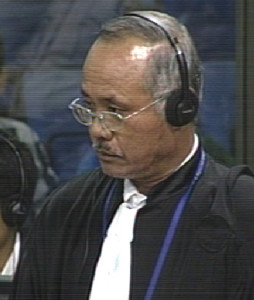
Civil Party Lawyer Hong Kim Suon
She then recalled that the elder men were gathered up and sent to cut the bamboo trees. Her father brought cattle along with him, but has disappeared since then. Her mother died of illness. Before her death, she was sick at the worksite for a long time, but was only sent to the hospital too late. “When one of my [children] died and I went to the commune hospital, I met her.” She showed her dead child to her mother, and has not heard any news from her mother since there. She was not allowed to see her mother, since they said that she was not a medic and could not help her anyway. Thus, it would waste working time.
When the Civil Party was sick, her sibling told her not to cry. “My mother wept when she heard that one of her [children] now disappeared”. Mr. Kim Suon sought permission to display a document that showed names of prisoners brought in from Ta Khmao.[9] This showed the name Chim Lang. Mr. Kim Suon wanted to know whether she had seen this document before, which the Civil Party confirmed. Mr. Kim Suon showed two more documents to the Civil Party.[10]
Mr. Kim Suon then presented the biography of Aum Ven Dony to the Civil Party.[11] She confirmed that this was the photograph of her sibling.
As for her feelings nowadays about having lost her family, she explained that she still missed them today.
“All my siblings were innocent and sweet people”.
When seeing other older people or children, she thought of her parents and children. “Whenever I thought of my own children, my tears came out. Whenever I was sick, no one took care of me”.
She was required to dig three cubic meters of earth every day, and she had to work at night time as well. She was not allowed to rest when she was sick. “That caused illness to me until now. I have stomach ache until now.” She had to take medical treatment until nowadays.
The Co-Prosecutors were given the floor. Mr. de Wilde wanted to know what her father’s, Kan Bath, occupation was. She recounted that he was a customs officer before 1975. Her father was an “innocent person” and gave the “innocent answer” that he was a professor before he was arrested.
As for her husband, she said that she did not see her husband for about a month. “Before they arrested as, they usually said they considered us an enemy”. She learned that her husband was detained at Koh Kor. She heard that they threw a grenade inside the office, which was why she thought all of the people in the office had died. Mr. de Wilde read an excerpt of her Civil Party Application. She had said that she and other people were taken to Koh Kor Village in the same district. She and the other wives were considered wives of enemies and were treated like prisoners.[12] She confirmed this account. She was sent there in late 1978. When they arrived at the island, they “forced us to do heavy work. So they deprived us of our food and forced us to work hard […]. Many people died at the place, including children and elder people. She had never met her siblings again. Nor did she find their photographs at Tuol Sleng. She went there three times. She saw them the first two times, but not the third.
Mr. de Wilde said that the Civil Party application indicated that her brother and sister-in-law entered S-21 in November 1976.[13] Mr. de Wilde inquired whether this corresponded to the time that they were arrested, or whether they had been arrested before this. She replied that she did not know when they were sent to S-21. She saw their names on a list.
Mr. de Wilde pointed to an S-21list, which showed her brother’s name.[14] She said that they were brought into the prison in February and that she thought that they were tortured at Tuol Sleng. “Whenever I taught my students about the regime, my tears came out”.
Mr. de Wilde then referred to a list that was entitled List of Prisoners Executed Between 1 November 1976 and 15 November 1976.[15] It was indicated that her sister-in-law came from S-21-D (which is believed to be Prey Sar). The Civil Party had heard that her sister-in-law was executed the day after her arrest, while her brother was interrogated for several months. With this, Mr. Kim Suon concluded his line of questioning.
Neither the Khieu Samphan nor the Nuon Chea Defense Team had questions for the Civil Party.
The Civil Party was given the opportunity to put questions to the witness. She explained that she “felt so lonely” and that “the pain remains with me.” She asked the accused why they “had to kill them all”. “Why those senior leaders are covered and not to be responsible for such mass killings?”
She said that the stupa in a pagoda in Kampong Speu was old and requested to renew the stupa. Moreover, she expressed her wish to build a library there to archive Khmer Rouge documents, so “the young generation can learn”. Judge Ya Sokhan thanked the Civil Party and dismissed her.
New Civil Party: Chau Kim
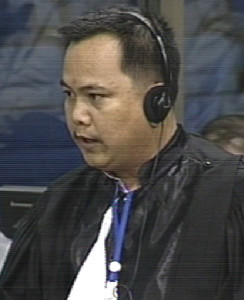
Civil Party Lawyer Kim Mengkhy
Chau Kim was born on 18 May 1938 and currently resides with his nephew. Civil Party Lawyer Kim Mengkhy from Lawyers Without Borders commenced his line of questioning by asking about the feelings of Mr. Kim when thinking about Democratic Kampuchea regime. Mr. Kim said that he was honored to sit in front of the Chamber. His main source of suffering was the death of his father and his two siblings. He did not know where they died. By July 1976, Angkar made him write a letter to his wife, so that she would also return to Cambodia. In August 1976, he was sent to the economic section, in which Hor Namhong was a member and another one was the chief. Chau Seng was arrested. This could be seen in his confession. Pol Pot ordered his arrest in November 1977. His name was changed to Cheng Suong at S-21. “Duch kept him alive […]. Duch wanted to pay gratitude to him”. During his two years of detention until February 1978, the Khmer Rouge forced him to write a confession totaling 200 pages, before Nuon Chea ordered him to be smashed. “We lost our hope, we lost our future”. Chau Seng’s wife was French and could not accept his death. “Her suffering could not be described in words”. He studied in Phnom Penh and France. He received a degree in French literature and psychology and pedagogy. In 1956 until 1957, he was a professor at a pedagogical school. In 1958, he was a member of a cabinet and became a Member of Parliament later. From 1960 until 1962, he was the minister of propaganda. From 1962 until 1964, he was minister of commerce and chief of cabinet from Sadech Sihanouk until 1966. He was vice senior from 1966 until 1968. He was also a chair person of a journalist association. From 1968 until 1970, he fled to France due to a threat from Lon Nol. He was minister in charge of the special mission of the GRUNK under the leadership of Samdech Sihanouk. On 14 September he came to Cambodia to rebuild the country. “The arbitrary killing of my elder brother gave us so much pain. I tried to seek for the truth everywhere”. They thought that he worked with Ieng Sary in the Ministry of Foreign Affairs. When Ieng Sary came to France to talk to them about the situation in the country and the Civil Party talked to him. Ieng Sary said that people were put into three groups at Boeng Trabek. Uk Savon was in charge there. People started disappearing. Later, it was said that Savon was an infiltrated enemy and was taken away and executed. Due to the disappearance of former embassy staff, Savon was questioned. He was killed later on.
Mr. Kim requested the Chamber to ask Nuon Chea why he ordered Duch to kill his brother Chau Seng.
He only found his brother’s name at S-21 on 19 August 2009 when Duch said that Chau Seng’s name was changed there. He was accused of being a secret agent for CIA in France.
I did not know why the Khmer Rouge had such a revenge against him. And that’s also a question I‘d like to put to Nuon Chea and Khieu Samphan: what my brother did that led him to be killed?
Mr. Mengkhy then asked about his brother’s relationship with Sihanouk and the like. He replied that his brother stopped doing politics after arriving in France. He also said that his brother contributed a lot to the Khmer Rouge Movement. “But no one understood why the Khmer Rouge killed the intellectuals. And such questions were asked until nowadays. Why the Khmer Rouge killed the intellectual people, who committed no wrongdoing?” Moreover, “the Khmer Rouge did not know the value of their knowledge”.
When he was the Secretary General, his brother “never had any conflict against the Khmer Rouge.”
Mr. Mengkhy quoted his statement: he had said that his brother was intelligent and empathetic and wanted to rebuild the country. “He should not have died in such a tragic way”, the Civil Party Lawyer quoted Mr. Kim. The Civil Party said that people might have been envious of his progressive brother. “Duch was also aware of this, because he was his student”. His brother was widely known in 1968. “He was not a corrupt person”. When he “joined the team”, he tried to clear the situation. “He was known to be a patriotic person, and it is difficult to find such a person in the regime. He helped a lot. He helped the Khmer Rouge. When he was the Minister, he helped Khieu Samphan. But the people in the right wing were not happy with this. He was not an ambitious person, because when we came from Kampuchea Krom, we were not the family of the elite. That’s why I try to find justice for him, to pay gratitude to him”.
For him, only two Khmer Rouge leaders were still alive. “And they should cooperate and answer, because the Cambodian society nearly disappeared. […] The Khmer Rouge need to be responsible for what they committed during the regime. And I’d like Nuon Chea and Khieu Samphan to confess” and to explain why they killed the intellectuals.
Questions by the Co-Prosecution
After the break, Mr. de Wilde inquired where the Civil Party was between 1975 and 1979. He answered that he received a scholarship to study in France, because he was a doctor by that time already. He left Cambodia in 1974 to become a pedagogical doctor. Mr. de Wilde asked whether his brother was disappointed that he was unable to travel back to Cambodia from 1970 onwards. He answered that Chau Seng returned “not long after the king arrived” in 1975. He joined the resistance with Sihanouk since the 1970s. “But nobody could ever imagine that the Khmer Rouge could ever have such a plan”. Mr. de Wilde read an excerpt of an AFP wire entitle Chau Seng Is in Phnom Penh.[16]
Mr. de Wilde then wanted to know why his brother was removed from Boeng Trabek. He remembered that a cadre had told him that his brother was taken away and that they had hoped that he would work together with Ieng Sary in the Ministry of Foreign Affairs.
Mr. de Wilde read another excerpt, in which he had said that he could improve the technique of stacking up earth and was therefore seen as an enemy.[17] Mr. de Wilde inquired whether his brother was a person who would “speak out his mind”. He replied that he did not belong to any French agency and that he did not work for the French government. “They used [this] pretext in order to kill him”.
The Senior Assistant Prosecutor then presented a photograph to the Civil Party.[18] The Civil Party said that he had obtained this document through the Documentation Center of Cambodia (DC-Cam) and that he recognized the handwriting of his brother. He said that the accusations were baseless.
Mr. de Wilde said that Duch had said that Nuon Chea ordered the execution of Chau Seng.[19] He recounted that he could find the relevant confession through Duch’s testimony. “Those people who were arrested, they did not dare to ask where my brother was brought to”.
With this, Mr. de Wilde concluded his line of questioning and the floor was handed to Judge Jean-Marc Lavergne, who wanted to know more about the relationship between the Khmer Rouge leaders and Chau Seng. He answered that Chau Seng and Khieu Samphan were close friends and that he studied literature at the same university that he studied law at. He went to another university only later on. Khieu Samphan and his brother met at Montpellier in 1957. He did not know whether his brother met with Khieu Samphan after 1975, but did not believe so. Hu Nim was also his close friend. Ta Kim Suy met Khieu Samphan later and conveyed a message to the Civil Party after 1979.
After this questioning by Judge Lavergne, Mr. Koppe asked him to confirm that his brother was a Special Representative of the Latefather Sihanouk for FUNK and asked whether he was also member of the Standing Committee. He replied that he joined the front, because the Samdech had asked him to bring him. He was the minister in charge of Special Missions, Mr. Kim said. He did not know whether he was a spokesperson, but he was “definitely with Samdech” at the time. He showed a photograph of his brother with the king. He then said that he was the representative of Samdech in Paris and gave press conferences. Some of the issues that were discussed were beyond the Civil Party’s knowledge, since he was not with his brother all the time.
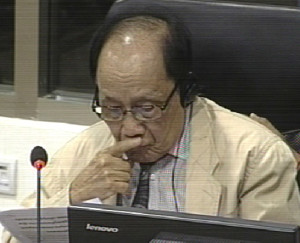
Civil Party Chau Kim
Mr. Koppe pointed to a document that indicated that his brother had been part of the front and Ministry of Foreign Affairs.[20] The Civil Party did not know why his brother was considered an important culprit at S-21. He wrote two letters to his wife in which he wrote that Angkar allowed him to write letters. In this letter, it was said that he was educated in Suong and was sent back to Phnom Penh later. Since the letter was reviewed by Angkar, he could not write whatever he wished to. Hu Nim sent a photograph to his brother when the former was still at the front, “because both were still very close to each other.” He did not know the reasons behind the arrests of his brother, but a supplementary factor might have been that he was “in the network” of Hu Nim. His brother once said that they should not take over Phnom Penh yet, but should instead wait until the Vietnamese took over Saigon, because they could help the Khmer Rouge.
Mr. Koppe then inquired about Hor Namhong. The Civil Party said that he did not join the Khmer Rouge, but joined Samdech instead.
“I have his document. He confessed that they were together at Boeng Trabek”.
When Chau Seng was taken out “he became the chief of the embassy section. Pan Nhat was the deputy”. He did not know whether he cooperated with Vorn, who was accused of being an infiltrated agent.
Mr. Koppe quoted the Civil Party’s statement that Hor Namhong was in Boeng Trabek, which was why they had the conflict between Sam Rainsy and Hor Namhong.[21] Mr. Kim replied that Hor Namhong “confessed by himself”. He was not in charge of the whole of Boeng Trabek, but that Hor Namhong was only in charge of the embassy section, which was one of the three categories at Boeng Trabek, the other two being students from abroad and former officials.
Mr. Koppe read an excerpt of Ros Chuor Siy who had testified last week. She had said that Hor Namhong was the chief at Boeng Trabek and was responsible for dividing tasks.[22] Mr. de Wilde interjected and said that the division of the three different sections had not been made by the defense last Thursday. Mr. Koppe said that the Civil Party last week had made the distinction. The Civil Party said that the whole office was divided into different sections. Mr. Koppe inquired whether Hor Namhong was involved in the decision to send Mr. Kim’s brother to S-21. Mr. Kim replied: “I don’t think so, because he came later on. Initially, my brother the chief”. Hor Namhong was promoted to be chief after the arrest of Mr. Kim’s brother.
The Civil Party then repeated his questions:
I want them to answer clearly where my brother Chau Seng was killed, and why. Because Duch testified clearly about his killing place. And another question is about the killing of the intellectuals. I want to know why they killed the intellectuals. I want to get clear answers on these questions. I also want to ask Khieu Samphan, if your honor grants me the permission. […]. Mr. Khieu Samphan, I would like to ask you a question. […]. Mr. Chau Seng was his close friend. Did he do anything wrong, did he betray the revolution? And why was he taken away to be killed? And another one, whether he ordered the killing of Chau Seng and accused him of being a CIA agent or spy.”
The President thanked the Civil Party and dismissed him. The hearing will continue tomorrow morning at 9 am with the key document hearings.
[1] E3/4002, Section 6.
[2] E3/6147a, at 001139790 (FR), 01069283 (EN).
[3] E3/4802, at 00516888 (KH), 00950201 (FR), 00916885 (EN).
[4] At 00516889 (KH), 00916885 (EN), 00950202 (FR).
[5] E3/6147a.
[6] E3/387, at 00350224 (EN), 00379509 (KH), 00441443 (FR).
[7] E3/6147a, at 00581459 (KH), 010692583 (EN) 01139790 (FR).
[8] E3/6147a, at 00581460 (KH), 001149790 (FR), 01069283 (EN).
[9] E3/8607.
[10] At 01012805; at 01009691-01009699.
[11] D22/18/5, at 0021408 (KH), 00234047 (EN), 00289730 (FR).
[12] E3/4671, at 00250788 (FR), 00211395 (KH), 00239762 (EN).
[13] D22/18/5.
[14] E3/8607. 67 (EN), 00088716 (KH).
[15] E3/3187, at 00008844 (KH), 00874397 (EN).
[16] E3/118.
[17] E3/89.
[18] E3/10609, 00246843 (KH).
[19] E1/57.1; 00195615 (FR), 00195604-05 (EN).
[20] E3/1993, at 0064840 (EN), 00079671 (KH), 00795339 (FR).
[21] D22/289.5, at 00481409 (KH).
[22] At 15:51.
